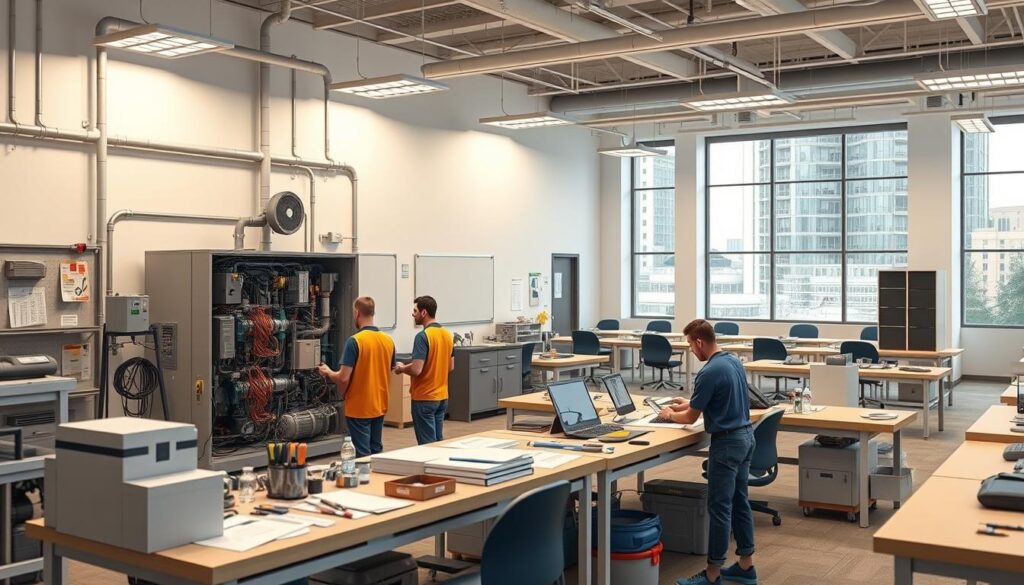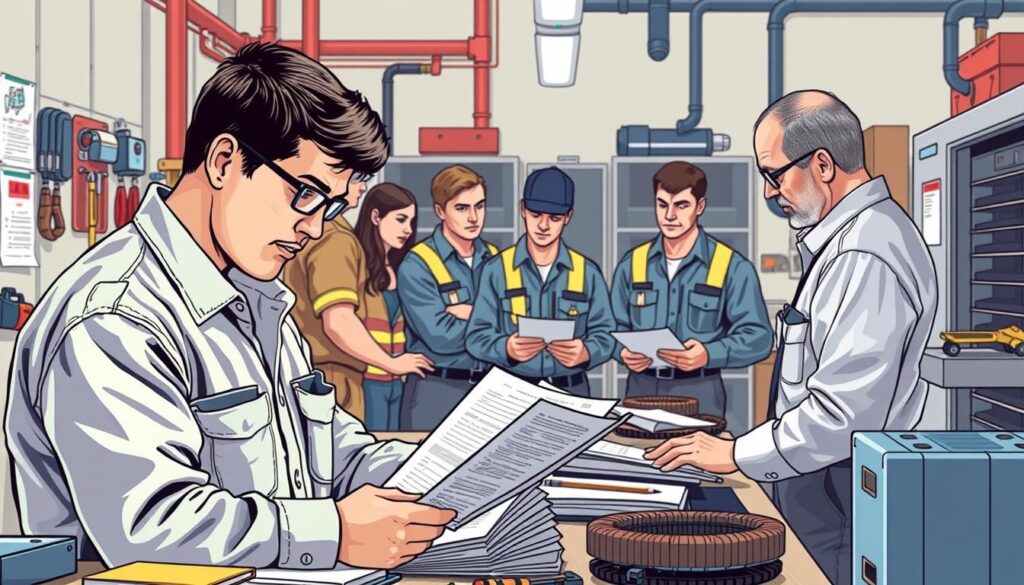Affiliate Disclosure
HVAC Guide Guys is a participant in the Amazon Services LLC Associates Program, an affiliate advertising program designed to provide a means for sites to earn advertising fees by advertising and linking to Amazon.
Ever wondered How Long Are You an Apprentice HVAC? Becoming an HVAC apprentice is more than a job. It’s a journey that changes you, requiring dedication and a deep love for the work.

HVAC apprenticeships usually last from three to five years. They offer a mix of learning by doing and getting the technical know-how you need. You’ll learn the skills to shine in the heating, ventilation, and air conditioning field.
Your apprenticeship will be a mix of classroom lessons and real-world practice. You’ll gain 2,000 to 3,000 hours of on-the-job experience. This prepares you for a rewarding career in HVAC technology.
Key Takeaways
- HVAC apprenticeships last 3-5 years
- Accumulate 2,000-3,000 hours of practical training
- Combines classroom learning with hands-on experience
- Prepares you for a professional HVAC career
- Offers path to becoming a certified HVAC technician
Table of Contents
Understanding the HVAC Apprenticeship Journey
Starting an HVAC apprenticeship is a great way to grow in your career. It’s a path that leads to becoming a skilled technician. You’ll go through a detailed training program that turns you from a beginner to a pro.
The HVAC apprentice program usually lasts 3 to 5 years. It’s a structured way to learn your trade. You’ll gain important experience through both hands-on training and classroom lessons.
Traditional Apprenticeship Timeline
Your apprenticeship will follow a clear learning path:
- First two years: Classes one day a week
- Work as a helper or junior technician
- Later years: Classes in the evenings with full-time work
Types of HVAC Apprenticeship Programs
There are several ways to become an HVAC expert:
- Union-sponsored programs: Follow a set training plan
- Contractor-sponsored programs
- Technical college apprenticeships
Requirements for Starting an Apprenticeship
To start your HVAC apprenticeship, you’ll need:
- Be at least 18 years old
- Have a high school diploma or GED
- A valid driver’s license
- Pass a math skills test
Most programs require about 2,000 hours of fieldwork and 144 hours of classroom lessons each year. With hard work, you could earn a good salary. In five years, you could make over $100,000.
Explore Our HVAC Shop
Looking for top-rated HVAC tools, parts, and accessories? Visit our shop and find the perfect solution for your needs.
Visit the ShopEducational Pathways to Become an HVAC Technician
Choosing the right educational path is key for those wanting to be HVAC technicians. Your path to becoming a skilled technician includes various training options. Knowing the different training times helps you decide on your future in this field.
Looking into HVAC education, you’ll find several paths to certification. Each path has its own benefits and training times. This lets you pick what fits your goals and lifestyle.
Trade School Programs
Trade school programs focus on quick, technical training. They usually last:
- 9 to 18 months
- They teach practical HVAC skills
- Include hands-on lab work
- Prepare you for industry certifications
Community College Options
Community college HVAC programs offer deeper education. They require:
- 2 to 3 years
- Associate degrees are available
- More technical and theoretical knowledge
- Can lead to higher starting wages
On-the-Job Training Opportunities
Practical experience is vital for HVAC careers. Apprenticeships offer real-world training, lasting:
- 3 to 5 years
- Includes paid work experience
- Guidance from experienced technicians
- Allows skill growth
Your educational choice greatly affects your HVAC career. Think about each option to match your goals and learning style.
Explore Our HVAC Shop
Looking for top-rated HVAC tools, parts, and accessories? Visit our shop and find the perfect solution for your needs.
Visit the ShopCore Skills Developed During HVAC Apprenticeship
Starting as an HVAC apprentice and becoming a journeyman requires learning many skills. You’ll gain key abilities that turn you into a skilled HVAC technician during your apprenticeship.
The main skills you’ll learn include:
- System Installation Techniques
- Refrigeration System Maintenance
- Advanced Troubleshooting Methods
- Electrical System Understanding
- Safety Protocol Implementation
Technical training is all about getting hands-on with tools and equipment. You’ll learn to work safely with complex HVAC systems. This prepares you for the EPA Section 608 certification exam. Practical experience becomes your most valuable teacher during this critical learning phase.
As you move from apprentice to journeyman, you’ll grow in both technical skills and soft skills. Skills like customer service, communication, and problem-solving are just as vital. Employers look for apprentices who are both technically skilled and have great people skills.
In 2021, there were over 241,000 apprentices in HVAC fields. Your training is a big chance for career growth. Most programs mix classroom learning with hands-on training. This way, you learn everything about heating, ventilation, air conditioning, and refrigeration systems.
Transitioning from Apprentice to Journeyman
Going from an HVAC apprentice to a journeyman is a big step in your career. It takes hard work, skill, and meeting certain requirements that change by state.

- Finish your apprenticeship training (usually 3-5 years)
- Log enough work hours
- Get the right certifications
- Pass exams set by your state
Required Working Hours
Getting certified depends on gaining lots of practical experience. Most programs ask for:
- At least 2,000 hours of on-the-job training each year
- About 144 hours of classroom learning yearly
- Between 6,000 to 8,000 hours of work before you can be a journeyman
Certification Requirements
To become a journeyman, you must meet several certification steps:
- EPA Section 608 Certification for working with refrigerants
- A state HVAC technician license
- Passing tough technical exams
- Keeping up with the latest safety training
State-Specific Regulations
Licensing rules vary by state. Some require certain education, while others focus on experience. Make sure to check your local rules to smoothly move from apprentice to journeyman.
Tip: Always check with your local licensing board for the latest info.
Explore Our HVAC Shop
Looking for top-rated HVAC tools, parts, and accessories? Visit our shop and find the perfect solution for your needs.
Visit the ShopHVAC Apprentice Salary and Career Growth
Starting your HVAC apprentice career can lead to great financial rewards. The length of your apprenticeship affects how much you can earn. Apprentices usually start making about half of what a journeyman technician makes. They can earn between $26,000 and $43,000 a year.
As you gain experience, your salary will grow. Beginners can earn around $32,175 a year. More experienced apprentices can make up to $50,331 annually. Hourly wages also increase, ranging from $16.38 to $18.01.
- Starting salary range: $26,000 – $43,000 annually
- Average hourly wage: $16.38 – $18.01
- Potential for rapid salary growth
Your salary depends on a few important things:
- Geographic location – Salaries vary by state
- Specialized skills and certifications
- Experience level
- Industry demand
As you move up in your apprenticeship, your salary will increase a lot. Experienced HVAC technicians can make a median of $51,390 a year. In states like California, Massachusetts, and New York, top performers can earn even more.
Investing in continuous learning and skill development is key to maximizing your HVAC career.
Training Components and Practical Experience
Your HVAC apprenticeship mixes tough technical training with broad educational experiences. Becoming an HVAC technician is a journey. It combines classroom learning with real-world practice.

The time needed for HVAC training varies, from 6 months to 5 years. You’ll learn key skills through various training parts. These are designed to get you ready for a successful HVAC career.
Hands-on Technical Training
Practical experience is key in your HVAC apprenticeship. You’ll learn by doing, through:
- Working with real HVAC equipment
- Troubleshooting complex heating and cooling systems
- Installing HVAC units for homes and businesses
- Doing diagnostic tests and maintenance
Classroom Instruction
Theory is just as important as practice. Classroom lessons cover:
- Electrical circuit basics
- Refrigeration system design
- Computerized control technologies
- Heating system principles
Safety Protocols and Procedures
Safety is always first in HVAC training. You’ll learn about:
- Safe handling of refrigerants
- Electrical safety rules
- Using personal protective equipment
- EPA certification needs
Your training gets you ready for a fulfilling HVAC career. You’ll gain technical skills and vital safety knowledge.
Alternative Paths to HVAC Certification
Not everyone takes the traditional apprenticeship route to become an HVAC technician. There are many alternative paths to enter this field. Each path has its own benefits for your career.
Looking into alternative certification options can make navigating HVAC trade school easier. There are several ways to become a technician:
- Online certification programs
- Accelerated training courses
- Military technical training
- Community college certificate programs
The time it takes to get certified can vary a lot depending on your choice. For example, certificate programs usually last from 6 months to 1 year. This is faster than traditional apprenticeships.
| Certification Path | Duration | Average Cost |
|---|---|---|
| Online Certification | 6-12 months | $800-$3,000 |
| Community College Certificate | 10-15 months | $3,000-$8,000 |
| Accelerated Training Program | 8-12 months | $5,000-$15,000 |
Each alternative path has its own advantages. Online programs offer flexibility. Accelerated courses pack a lot into a short time. Military veterans can use their training to cut down on certification needs.
Keep in mind, no matter your path, getting EPA certification is key. The Universal EPA Section 608 Technician certification is vital for working with refrigerant systems in various equipment.
Explore Our HVAC Shop
Looking for top-rated HVAC tools, parts, and accessories? Visit our shop and find the perfect solution for your needs.
Visit the ShopProfessional Development and Advancement Opportunities
Starting as an HVAC apprentice and moving to journeyman offers many chances to grow. Planning your career path is key to reaching your full HVAC industry success.
There are several ways to advance in your HVAC career:
- Specialized Certifications
- Advanced Technical Training
- Management Roles
- Independent Business Ownership
To become an HVAC journeyman, you need lots of work experience and professional certifications. North American Technician Excellence (NATE) certification is highly valued for technicians with two years of experience. It proves your skills and boosts your career.
“Continuous learning is the key to success in the ever-evolving HVAC industry.” – HVAC Professional Association
Your salary can grow with your experience. New technicians start at $22.47 an hour, and experienced ones can make up to $32.83. After 10+ years, you might want to start your own HVAC business.
Here are some tips for moving up:
- Take advanced technical courses
- Get specialized certifications
- Keep up with green technology
- Connect with other HVAC pros
The HVAC field is expanding, thanks to new projects and green tech. By focusing on your growth, you can turn your apprenticeship into a rewarding career.
Conclusion
Knowing how long you’ll be an HVAC apprentice is key to planning your career. An HVAC apprenticeship usually lasts 3 to 5 years. This time can vary based on state rules and job opportunities. Your hard work during this time will shape your success in this field.
Being an HVAC apprentice is more than just logging hours. You’ll learn important technical skills and safety rules. You’ll also get hands-on experience that turns you into a skilled worker. States like Texas and California have specific rules, so keeping track of your hours is important for your future.
Investing in your apprenticeship puts you in a growing field with good job chances. HVAC tech jobs are set to grow by 15% in four years. Starting salaries are around $40,000 to $50,000 a year. Your pay can go up to $23 an hour by your fifth year, making it a rewarding career.
Your success comes from picking the right training and knowing state rules. Whether it’s through trade schools, community colleges, or on-the-job training, your apprenticeship is a smart choice. It leads to a stable, in-demand career with lots of room to grow.

